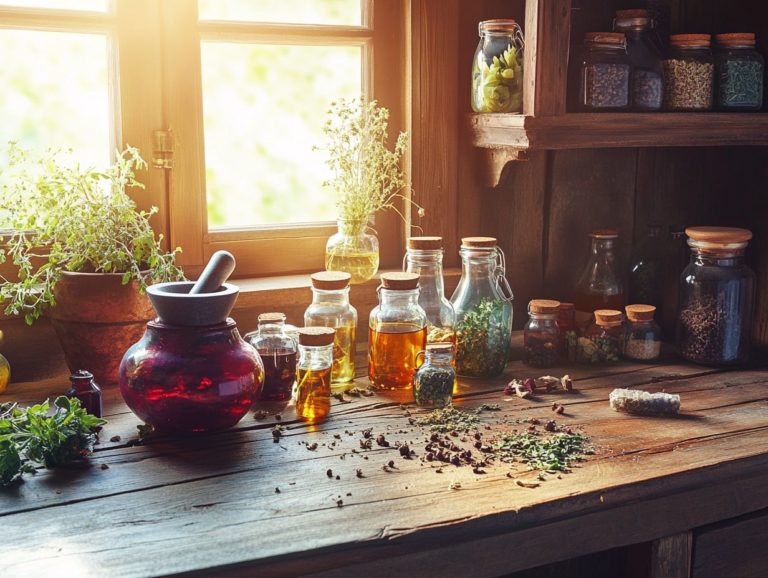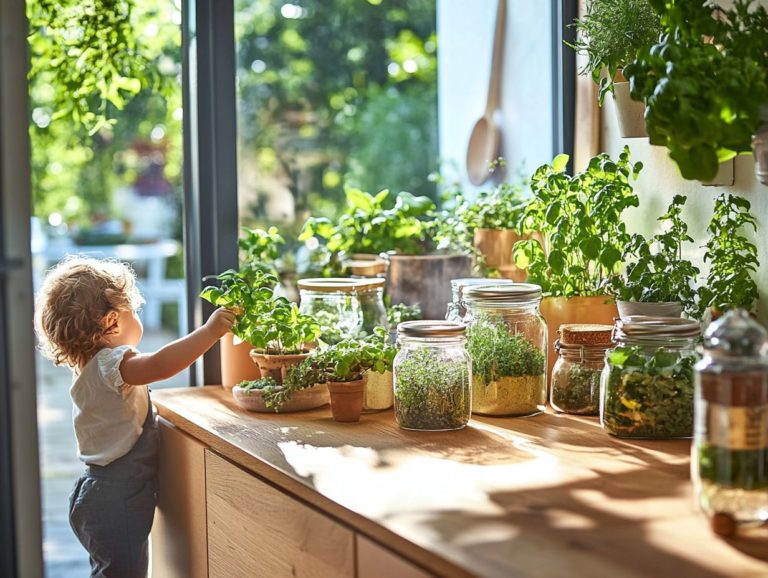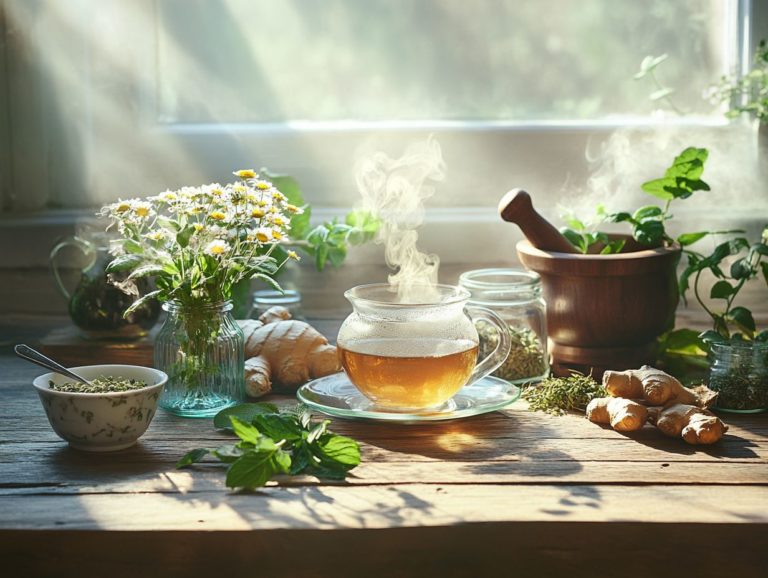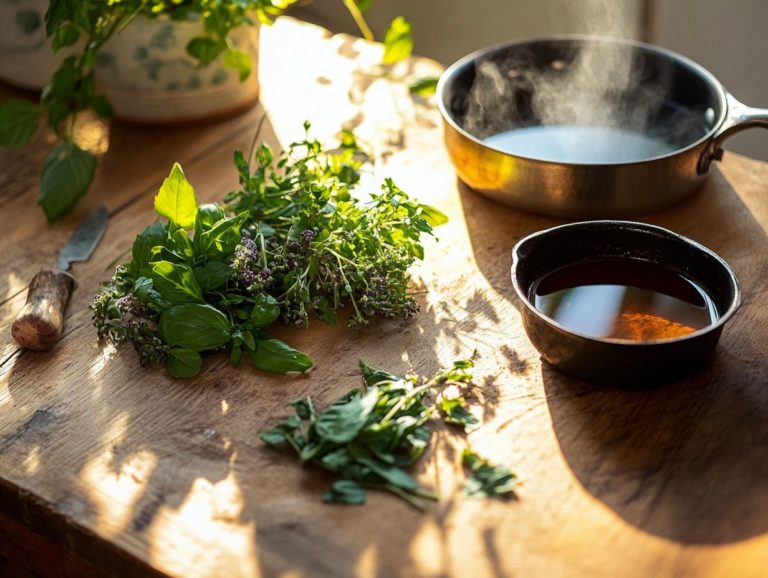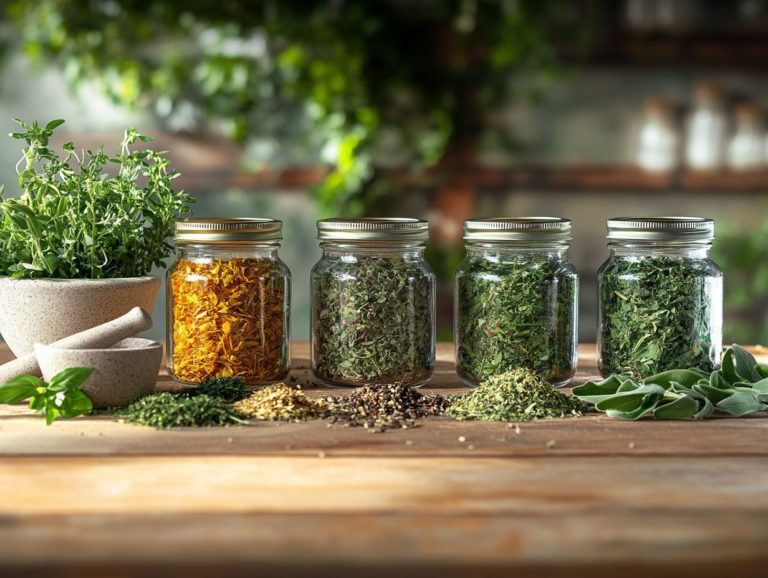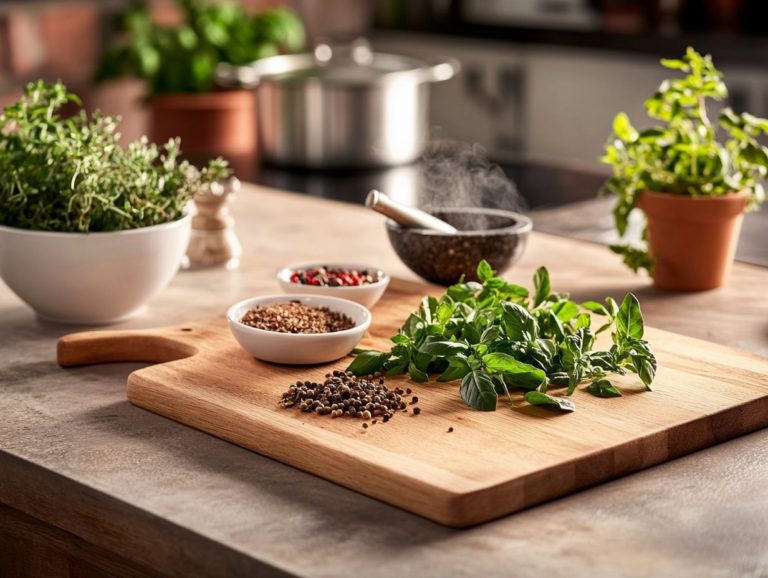5 Essential Herbal Preparations for Beginners
Herbal preparations, including herbal supplements, have been cherished for centuries, providing a natural pathway to wellness and self-care.
From calming teas to potent tinctures, these methods tap into the remarkable power of medicinal herbs and plant remedies to enhance health and vitality.
Discover five essential herbal preparations that can transform your health! You’ll quickly learn how to choose the right one for you, along with tips for crafting your own at home.
Dive into the exciting world of herbal remedies and learn how they can elevate your health and wellness!
Contents
Key Takeaways:
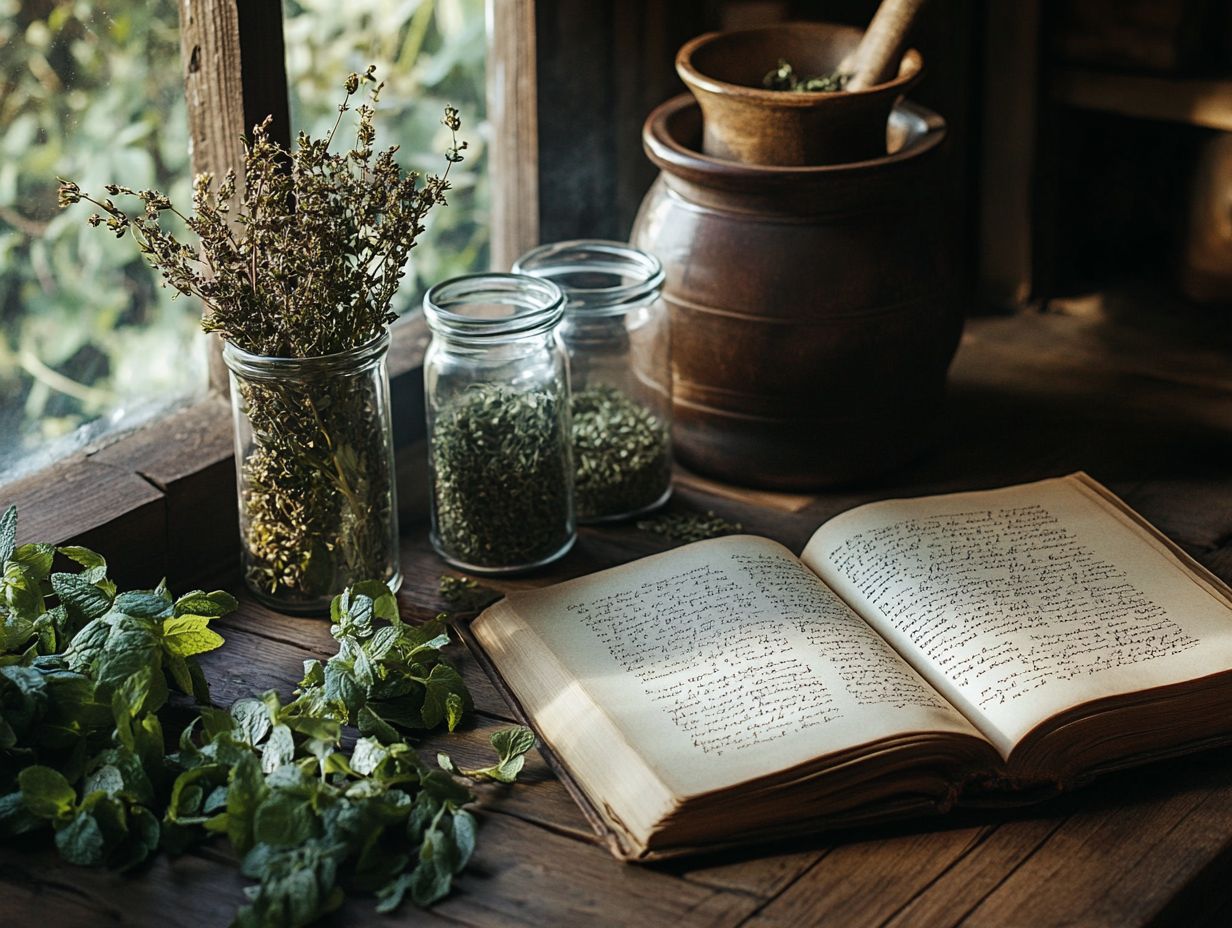
- Infusions and decoctions are simple and effective ways to extract the medicinal properties of herbs and harness the health benefits through steeping and boiling.
- Tinctures and salves offer longer shelf life and concentrated effects, making them essential for herbalists and teachers for storing and using herbs in the long-term.
- Herbal teas are a versatile and easy way to incorporate herbs into your daily routine for overall health and wellness benefits.
1. Infusions
Infusions are an essential technique in herbal medicine that allows you to extract the medicinal properties of various herbs, including those that boost your immune system. By steeping these herbs in water, you transform their qualities into beneficial preparations that enhance your health and wellness.
Start by choosing good quality ingredients. This crucial step directly impacts the potency and effectiveness of your infusion. For instance, Chamomile is renowned for its calming effects, helping to ease anxiety and promote restful sleep. Meanwhile, Elderberry is celebrated for its remarkable ability to strengthen the immune system and ward off colds. To ensure safe and effective use of herbs, consider following these essential tips for safe herbal use.
When you embark on the art of creating herbal infusions in your home apothecary, sourcing fresh or dried herbs that are free from pesticides and contaminants becomes paramount. This thoughtful consideration maximizes the health benefits you derive while fostering a deeper connection to natural remedies. Ultimately, it gives you the power to take charge of your wellness in a holistic and meaningful way.
2. Decoctions
Decoctions are an essential technique in herbal medicine, involving the boiling of tougher plant materials to unlock their medicinal properties, particularly from roots and bark. This method extracts powerful herbal remedies for a variety of health ailments.
This approach shines especially bright with herbs like Ginger and Ginseng, celebrated for their health-boosting benefits, including anti-inflammatory and energy-enhancing effects. To prepare a decoction, start by coarsely chopping the plant materials to maximize surface area. Then, combine the herbs with water in a pot and bring the mixture to a gentle simmer. For those looking for quick and delicious options, check out these 5 quick herbal tea recipes for busy lives.
Follow safety tips during this process. Utilize clean utensils and ensure you’re following proper dosages, as certain herbs can wield significant effects. Straining the mixture will provide you with a concentrated herbal infusion that can be enjoyed in various therapeutic contexts. For a refreshing twist, consider trying 5 delightful DIY herbal teas for wellness.
3. Tinctures
Tinctures are concentrated herbal extracts crafted from alcohol or vinegar, designed to preserve and enhance the medicinal properties of specific herbs. This makes them a popular choice among herbalists and educators for their ease of use and impressive shelf life.
The process begins with selecting high-quality dried or fresh herbs, like Goldenseal for its immune-boosting benefits or Valerian for its soothing effects on the nervous system. Once you’ve prepared the herbs, you submerge them in your chosen solvent, allowing the beneficial compounds to leach into the liquid over several weeks. To avoid pitfalls, be aware of common herbal dosage mistakes and ensure periodic shaking during this time for optimal extraction.
After straining, the resulting tincture can be stored in dark glass bottles, preserving its potency for an extended period. This convenience allows you to seamlessly incorporate these extracts into your herbal medicine routine, delivering concentrated benefits with just a few drops.
Start your herbal journey today and discover a healthier you!
4. Salves
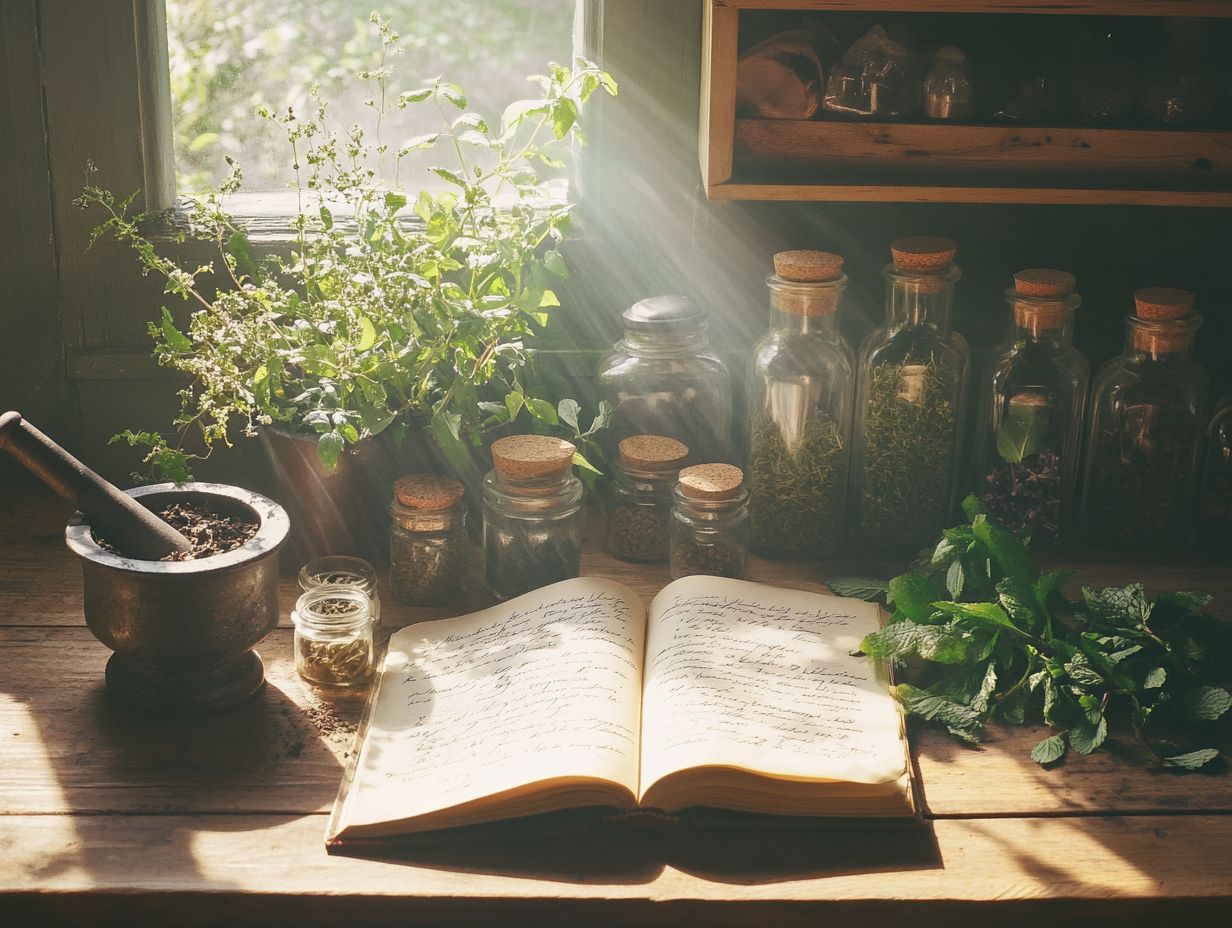
Salves are your go-to topical herbal preparations, crafted from infused oils mixed with beeswax to deliver the medicinal benefits of herbs directly to your skin. They effectively address a range of ailments while enhancing your overall health and wellness through the power of plant remedies.
The journey of creating these soothing balms begins with selecting your base oil, whether it s olive oil or coconut oil. Both oils are celebrated for their nourishing properties. Once you’ve chosen your oil, you can infuse it with herbs like Calendula and Feverfew.
Calendula is particularly esteemed for its anti-inflammatory and healing effects, making it perfect for addressing skin irritations. On the other hand, Feverfew has a rich history of being used for its pain-relieving properties, especially when it comes to alleviating headaches.
Next, you’ll combine the infused oil with melted beeswax, allowing your salve to solidify and maintain its shape, making application a breeze. By adding essential oils, you can elevate both the fragrance and therapeutic effects. This results in a customized herbal remedy that s perfect for tackling various minor ailments in your home herbal apothecary.
5. Herbal Teas
Herbal teas present a delightful and accessible avenue for you to tap into the rich health benefits of various herbs. They serve not just as a soothing beverage but also as a vital part of herbal medicine, promoting wellness and healing through the power of natural ingredients.
You ll discover a multitude of varieties of herbal teas, each with its own distinct flavors and advantages. For instance, Hibiscus tea, with its tart and vibrant profile, may help lower blood pressure and enhance heart health.
Holy Basil is celebrated in traditional herbalism for its stress-relieving and immune-boosting properties. Making these teas is easy! Just steep dried leaves, flowers, or roots in hot water, and watch the magic happen.
As you explore different herbal blends, you’ll deepen your understanding of herbalism. It’s crucial to appreciate their unique benefits while crafting personalized wellness routines that resonate with you. Start brewing your own herbal tea today and experience the incredible benefits for yourself!
What Are Herbal Preparations and Why Are They Important?
Herbal preparations encompass a diverse array of methods for extracting and utilizing the therapeutic properties of plants. They serve as a cornerstone of herbal medicine, offering effective remedies that can significantly enhance your health and wellness, especially when crafted from high-quality ingredients for optimal results.
Rooted in ancient traditions, many cultures have long relied on the healing potential of herbs, well before modern pharmaceuticals came onto the scene. Today, there s a renewed interest in herbal preparations as more individuals seek natural alternatives to address everything from mild inflammation to chronic illnesses.
Integrating herbalism into your health regimen often involves a deep dive into the properties of various plants and discovering how they can complement conventional treatments. This fosters a holistic approach to wellness that honors both time-honored wisdom and contemporary science. It allows you to navigate your health journey with confidence and sophistication.
What Are the Different Types of Herbal Preparations?
The world of herbal preparations is rich with variety, encompassing infusions, decoctions, tinctures, and salves. Each method has its own unique extraction techniques and applications tailored to distinct health needs, showcasing the versatility of herbal medicine.
For anyone interested in natural health methods, understanding these preparations is essential. Take infusions, for instance. They involve steeping delicate herbs in hot water, making them perfect for plants like chamomile, celebrated for its relaxing and digestive properties. To enhance your sleep, consider exploring 5 must-try herbal preparations for better sleep.
Decoctions are crafted by boiling tougher plant materials, ideal for roots like ginger, which effectively alleviates nausea and reduces inflammation. Tinctures utilize alcohol to draw out potent compounds from herbs. For those interested in learning more about making these remedies, herbal preparations: extracting the essence provides valuable insights. Echinacea is a prime example, known for its immune-boosting benefits.
Finally, salves blend herbs with oils and wax to create topical remedies like calendula, recognized for its skin-healing properties. Each preparation serves a distinct purpose, showcasing how herbal medicine can cater to specific wellness needs with elegance and efficacy.
How Can One Determine Which Herbal Preparation to Use?
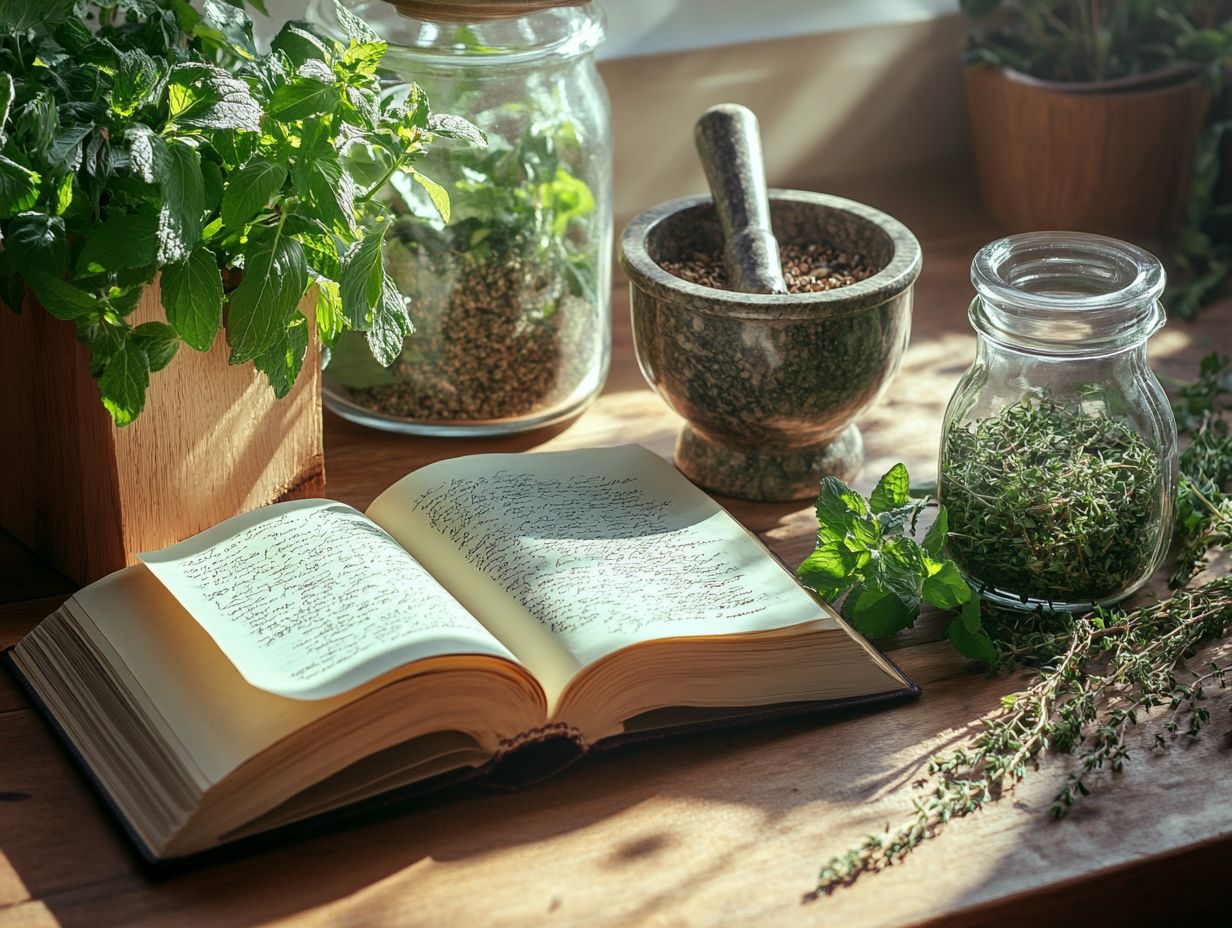
Choosing the right herbal preparation requires understanding the unique health benefits of each remedy, the specific condition you’re addressing, and your personal preferences. This creates a truly personalized approach to your herbal medicine practice.
When selecting herbal options, consider the ailment you’re tackling whether it’s chronic pain, digestive issues, or stress management. Different herbs offer varied health benefits. Think about the desired effects; do you prefer a calming or energizing remedy? Your individual preferences, including taste and form, be it teas, tinctures, or capsules, are essential for ensuring you’ll use the remedy consistently. Additionally, refer to creating herbal remedies: safety tips to ensure safe preparation and usage.
Equipping yourself with knowledge about herbalism elevates your decision-making skills and deepens your connection to these natural remedies. This gives you the power to make informed and confident choices on your health and wellness journey.
What Are the Key Ingredients in Herbal Preparations?
Key ingredients in herbal preparations include high-quality medicinal herbs known for their safety and effectiveness. These are essential for crafting reliable herbal remedies that adhere to safety guidelines.
Herbs like chamomile, known for its calming properties, and Echinacea, frequently used for immune support, enhance the efficacy of these natural treatments. Sourcing these herbs from reputable suppliers is crucial; the quality of the components directly impacts the effectiveness of the preparations.
By following strict safety guidelines, you can trust these remedies to minimize the risk of adverse reactions while maximizing their therapeutic benefits. Merging knowledge of these herbs with careful sourcing and safety practices empowers you to explore holistic options for health and wellness.
How Can One Make Their Own Herbal Preparations at Home?
Making your own herbal preparations at home is an exciting adventure! It allows you to craft personalized remedies tailored to your health needs. This practice deepens your connection to the art of herbal medicine while enhancing your home herbal apothecary.
As you embark on this journey, explore the fascinating world of herbs, gaining insight into their unique properties and benefits. Whether you’re steeping herbs in hot water to create a soothing infusion or extracting their essence in alcohol or vinegar to make a potent tincture, each step is both educational and fulfilling.
Start with familiar herbs from your garden or local store, and gradually expand your collection as you discover which ones resonate most with you. Engaging with the natural world in this way not only sparks your creativity but also opens doors to self-healing and overall wellness.
Try making your own tincture today and discover the joy of crafting personalized remedies!
What Are Some Common Herbs Used in Herbal Preparations?
Some common herbs in herbal preparations include Echinacea, Ginkgo, and Garlic. Each of these herbs boasts unique health benefits that herbalists and educators regard as essential to the practice of herbal medicine.
Echinacea is renowned for its immune-boosting properties. It is often used to ward off colds and infections.
Ginkgo is celebrated for its ability to enhance cognitive function and improve circulation. Then there’s Garlic, a staple in your kitchen, known for its powerful antimicrobial and cardiovascular benefits. It s a favorite among both traditional healers and modern health enthusiasts.
These herbs have rich histories, deeply rooted in various cultures. They served as remedies for ailments long before pharmaceuticals came on the scene.
These herbs are still significant today, as they frequently find their way into teas, tinctures, and capsules, reflecting the growing enthusiasm for natural wellness solutions.
Frequently Asked Questions
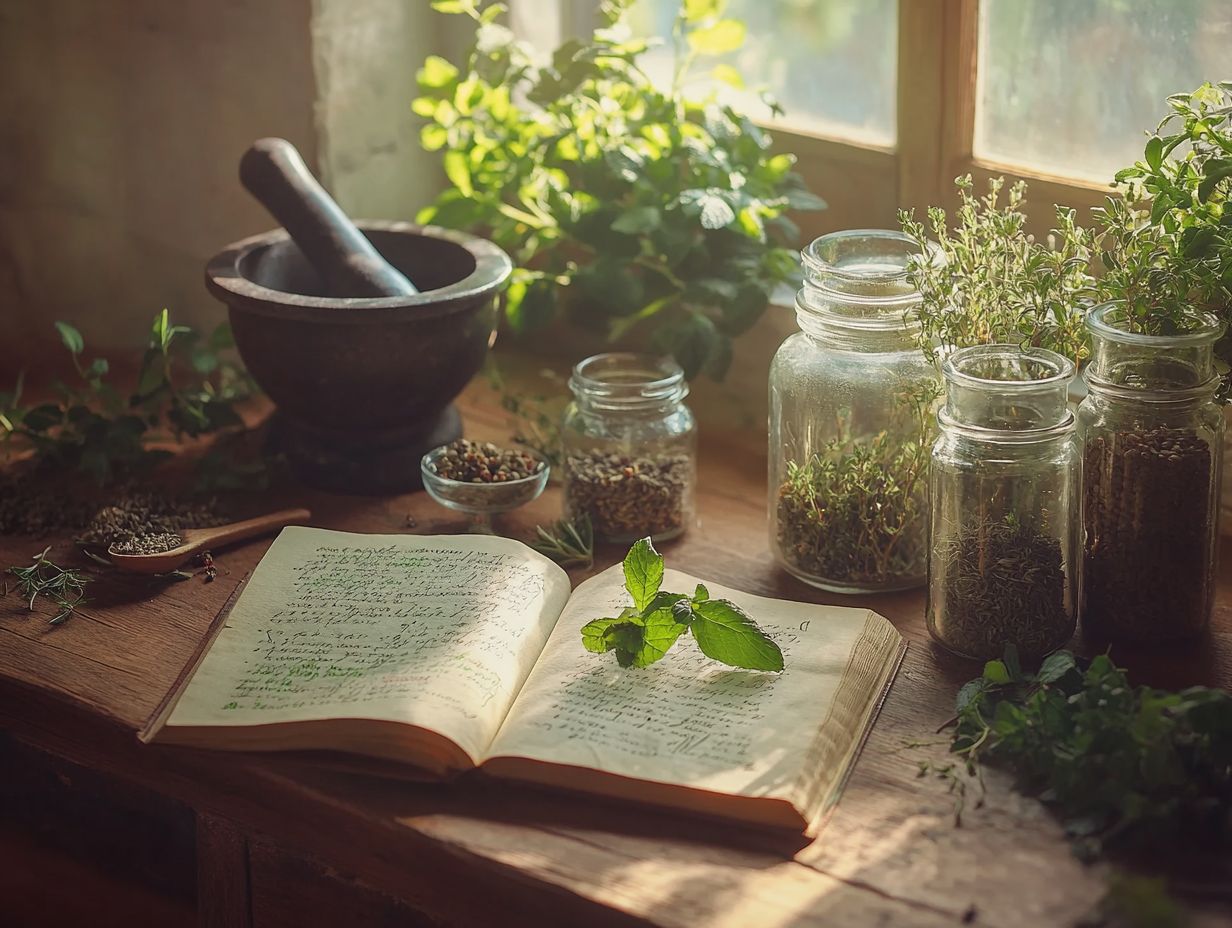
What are the 5 essential herbal preparations for beginners?
The 5 essential herbal preparations for beginners are infusions, decoctions, tinctures, salves, and poultices. These are essential techniques you ll love exploring!
What is an infusion and how is it made?
An infusion is a method of extracting the medicinal properties of herbs by steeping them in hot water. To make an infusion, pour hot water over the herb and let it sit for a few minutes before straining and drinking.
How do I make a decoction?
A decoction involves simmering the herbs in water for a longer period to extract their medicinal properties. To make a decoction, use a stovetop and a pot instead of just hot water.
What is a tincture and how is it used?
A tincture is a concentrated herbal extract made by soaking herbs in alcohol or vinegar. It is typically used as a medicinal remedy, with a few drops taken orally or added to water. It s a convenient and long-lasting way to use herbs.
How do I make a salve and what is it used for?
A salve is a topical ointment made with herbs and a base, such as beeswax or coconut oil. It can be used for various skin conditions, as well as on sore muscles and joints.
To make a salve, melt the base and mix it with your chosen herbs before letting it solidify.
What is a poultice and how is it applied?
A poultice is a soft, moist mass of herbs applied to the skin to help with inflammation, bruises, and other ailments. It is typically made by mixing herbs with hot water or oil and applying it directly to the affected area.
Then, cover it with a cloth or bandage.
Ready to try your hand at herbal preparations? Dive into your herbal journey today and discover the power of nature!

